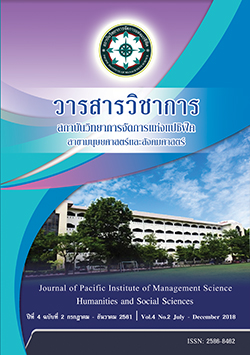Strategy for Transformational Leadership Development of Secondary School Administrators under The Regional of Education Office No.9
Keywords:
Strategy, Transformational leadership developmentAbstract
This research aimed to develop a strategy for transformational leadership development of secondary school administrators under the Regional of Education Office No.9. The study was divided into 3 phases for obtaining qualitative and quantitative data. Phase 1 was to investigate the present state and needs of transformational leadership development of secondary school administrators under the Regional of Education Office No.9. The information was obtained by conducting questionnaire survey from a sample of 360 individual consisted of Deputy directors, Heads of administration affair, and Heads of subject matters and interviewing 9 experts on transformational leadership development. Phase 2 was to create a strategy for transformational leadership development of secondary school administrators under the Regional of Education Office No.9 and to verify the accuracy and suitability of the strategy by 5 experts. Phase 3 was to evaluate the feasibility and suitability of the proposed strategy by 91 director of Secondary Educational Service Area Office and school director under the Regional of Education Office No.9. A questionnaire, a semi-structured interview form, and an evaluation form were used as tools for collecting data. Percentage, Mean, and Standard Deviation were employed for analyzing quantitative data. Modified Priority Needs Index (PNImodified) and content analysis were used for analyzing needs assessment and qualitative data, respectively.
Findings revealed as follows:
1. The actual state of transformational leadership development of secondary school administrators under the Regional of Education Office No.9 in all aspects was at a high level. Considering each aspect, it was found that the highest mean score was Individual consideration aspect (= 4.14), followed by Inspiration motivation aspect (
= 4.12), Idealized influence aspect, and Intellectual stimulation aspect (
= 4.11), respectively. The expected state of transformational leadership development of secondary school administrators under the Regional of Education Office No.9 in all aspects was found at the highest level. The highest mean score of the expected aspect was Inspiration motivation aspect (
= 4.62), followed by Idealized influence aspect (
= 4.61), Individual consideration aspect, and Intellectual stimulation aspect (
= 4.59), respectively.
Needs for transformational leadership development of secondary school administrators under the Regional of Education Office No.9 found that the highest value was Idealized influence (PNImodified0.122), followed by Inspiration motivation (PNImodified0.121), Intellectual stimulation (PNImodified 0.117), and Individual consideration (PNImodified 0.109), respectively.
2. Strategy for transformational leadership development of secondary school administrators under the Regional of Education Office No.9 comprised 4 main aspects; 1) Creating a shared vision, 2) Conducting achievement motivation, 3) Constructing Learning organization, and 4) Building Interpersonal relationship.
3. The overall suitability and feasibility of applying the Strategy for transformational leadership development of secondary school administrators under the Regional of Education Office No. was rated at a high level.
References
กฤติยา จันทรเสนา และนพดล เจนอักษร. (2566). ความสัมพันธ์ระหว่างภาวะผู้นำกับองค์การแห่งการเรียนรู้ของสถานศึกษา สังกัดสำนักงานเขตพื้นที่การศึกษาประถมศึกษานครปฐม เขต 1. วารสารการบริหารการศึกษา. มหาวิทยาลัยศิลปากร.
จารุวัจน์ สองเมือง. (2559: ออนไลน์). การบริหารสถานศึกษาในศตวรรษที่ 21. สืบค้นจาก http://www.deepsouthwatch.org/node/8009.
จุมพล พูลภัทรชีวิต และคณะ. (2553). การวิเคราะห์บริบท: ความท้าทายของการบริหารการศึกษาในอนาคต. ฉบับปรับปรุง พฤษภาคม 2553. กรุงเทพมหานคร: โรงพิมพ์จุฬาลงกรณ์มหาวิทยาลัย.
ชาญชัย อาจินสมาจาร. (2543). ทักษะการบริหารทีมงาน. กรุงเทพฯ: Mit Training Center.
ณัฏฐพันธ์ เขจรนันท์ และฉัตยาพร เสมอใจ. (2548). การจัดการ. กรุงเทพฯ: ส. เอเชียเพรส.
ธวัชชัย หอมยามเย็น. (2548). การศึกษาภาวะผู้นำการเปลี่ยนแปลงของผู้บริหารสถานศึกษาขั้นพื้นฐานสังกัดสำนักงานเขตพื้นที่ การศึกษาหนองคาย เขต 2. รายงานการศึกษาค้นคว้าอิสระ ปริญญามหาบัณฑิต สาขาการบริหารการศึกษา บัณฑิตวิทยาลัย มหาวิทยาลัยขอนแก่น.
นิตย์ สัมมาพันธ์. (2546). ภาวะผู้นำ: พลังขับเคลื่อนองค์กรสู่ความเป็นเลิศ. กรุงเทพฯ:อินโนกราฟฟิกส์.บุญช่วย สายราม. (2559: ออนไลน์). ทักษะภาวะผู้นำองค์กรโรงเรียนในศตวรรษที่ 21. สืบค้นจาก http://www.gotoknow.org2posts2565807.
ประพนธ์ ผาสุขยืด. (2541). ทางเลือกทางรอด. กรุงเทพฯ: สำนักพิมพ์เออาร์อินฟอร์เมชั่น แอนด์ พับบิเคชั่น.
พิมพ์อร สดเอี่ยม. (2552). รายวิชาภาวะผู้นำทางการศึกษา. เลย: คณะครุศาสตร์ มหาวิทยาลัยราชภัฎเลย.
สมยศ นาวีการ. (2546). การบริหารและพฤติกรรมองค์การ. (พิมพ์ครั้งที่ 3). กรุงเทพฯ: โรงพิมพ์ตะวันออก.
สมศักดิ์ สินธุระเวชญ์ (2542). มุ่งสู่คุณภาพการศึกษา. กรุงเทพฯ: วัฒนาพานิช.
สราญรัตน์ จันทะมล. (2548). ภาวะผู้นำการเปลี่ยนแปลงของผู้บริหารสถานศึกษาขั้นพื้นฐาน สังกัดสำนักงานเขตพื้นที่การศึกษาเลยเขต 2. วิทยานิพนธ์นิพนธ์ศึกษาศาสตรมหาบัณฑิต มหาวิทยาลัยขอนแก่น.
สุเทพ พงศ์ศรีวัฒน์. (2548). บริบทในการเลือกใช้ภาวะผู้นำแห่งการเปลี่ยนแปลงและภาวะผู้นำแห่งการแลกเปลี่ยน. วารสารเอ็มบีเอ. ปีที่ 7 ฉบับที่ 74.
Bass, B. M., & Avolio, B. J. (1994). Transformational Leadership Development. Pola Alto, California: Consulting Psychologists.
Downloads
Published
Issue
Section
License
บทความที่ได้รับการตีพิมพ์เป็นลิขสิทธิ์ของ สถาบันวิทยาการจัดการแห่งแปซิฟิค
ข้อความที่ปรากฏในบทความแต่ละเรื่องในวารสารวิชาการเล่มนี้เป็นความคิดเห็นส่วนตัวของผู้เขียนแต่ละท่านไม่เกี่ยวข้องกับสถาบันวิทยาการจัดการแห่งแปซิฟิค และคณาจารย์ท่านอื่นๆในสถาบันฯ แต่อย่างใด ความรับผิดชอบองค์ประกอบทั้งหมดของบทความแต่ละเรื่องเป็นของผู้เขียนแต่ละท่าน หากมีความผิดพลาดใดๆ ผู้เขียนแต่ละท่านจะรับผิดชอบบทความของตนเองแต่ผู้เดียว







